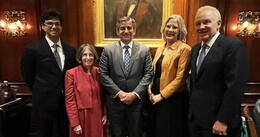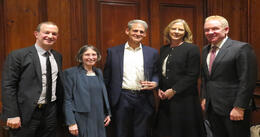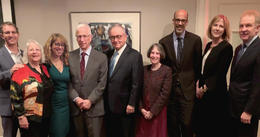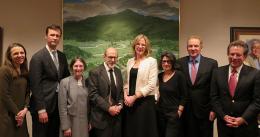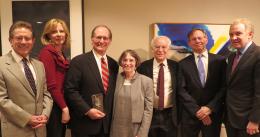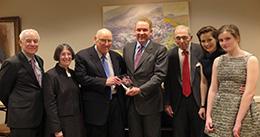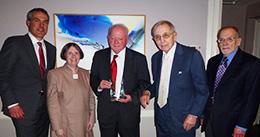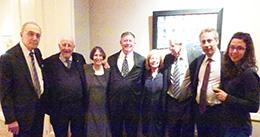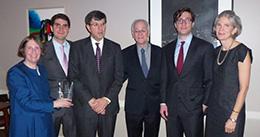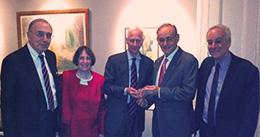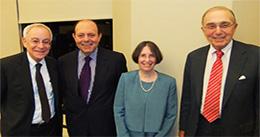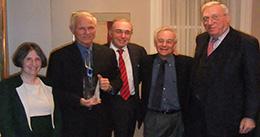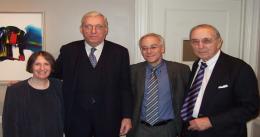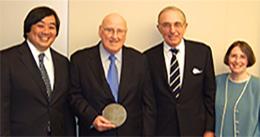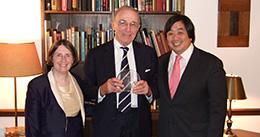In remarking on the presentation of the award, Robert J. Giuffra, Jr. ’87, Co-Chair of Sullivan & Cromwell LLP and Chairman of the Center’s Board of Advisors stated:
“Tonight, we present the Simeon E. Baldwin Award to Frank Jimenez, one of the most distinguished and respected graduates of our law school…Frank’s life is the embodiment of the American dream. His parents were refugees from Castro’s Cuba…[and] worked very hard to make a life in America. They raised very successful children…Frank has had a long and distinguished career in government, [culminating in being] appointed General Counsel of the Navy, one of seven Senate-confirmed Pentagon civilians of four-star equivalent rank…After leaving Washington, Frank became General Counsel of conglomerate ITT Corporation…Frank is now the GC of GE HealthCare. Among GCs, Frank is respected for his intellect, strategic judgment, and - thanks to his Yale Law School education - his ability to navigate different industries. He is also known for his high ethics…Frank, congratulations! We are delighted to honor you with the 2024 Simeon E. Baldwin Award.”
Heather Gerken, YLS Dean and Sol & Lillian Goldman Professor of Law, added that:
“…Frank embodies the very best of Yale Law School: leadership, service, and integrity. Frank is more than deserving of this year’s award…Even as an outstanding attorney in private practice, Frank maintained an appetite for impact. Soon after he graduated, a change in the U.S. Cuban refugee policy ordered the Coast Guard to send refugees intercepted on the high seas to Guantánamo. Frank and a group of attorneys in the Cuban American Bar Association brought action against the Administration, seeking justice on behalf of refugees in need. The Florida Supreme Court recognized his group’s efforts with a pro bono service award, a testament to his diverse abilities…Frank’s restless spirit led him to public service, where his career in government spanned multiple presidents and many more titles…
A pivot from Miami Big Law to the Pentagon may feel daunting to most, but Frank has always been one to embrace change. The comfort with the unexpected is what also led him to an entire new professional realm: the corporate world. Following his career in government, Frank went on to hold positions at the helm of some of our country’s highest grossing companies…But as all of us in this room know, there is much more to Frank’s story than his long list of extraordinary accomplishments. It’s Frank’s character that sets him apart. And in a short time, Frank rose to the highest levels of leadership in government and in the private sector. But along the way, Frank remained true to himself and modeled our community’s most celebrated values…Frank cares deeply about the humanity of others, and he believes in the power of incorporating ‘perspectives from all walks of life.’ He has been a mentor to many, and has also devoted countless hours to making the YLS community stronger…I think Frank said it best when he said that ‘the best [leaders] rise by building up others.’ Frank has spent his entire career doing just that - from his time as a student at Yale Law School to his time at the Pentagon, Frank is a testament to the power of leadership done well. He has always known that teams succeed together, and that culture of success is cultivated by Frank each and every day. Congratulations, Frank. It is an honor to present you with the Simeon E. Baldwin Award, in honor of your lifelong accomplishments. Thank you for your service to the business community, to YLS, and to our country.”

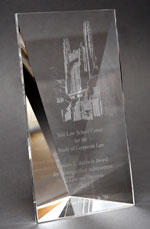 The Simeon E. Baldwin Award was established in 2007 and is presented by the Center to a Yale Law School graduate or faculty member in recognition of distinguished achievement in law and business.
The Simeon E. Baldwin Award was established in 2007 and is presented by the Center to a Yale Law School graduate or faculty member in recognition of distinguished achievement in law and business. 